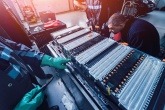Consortium to investigate battery waste fires
Independent environmental consultancy Euomonia has set up a consortium to investigate the costs of, and potential measures to prevent, fires which are being started by lithium-ion (li-ion) batteries in waste.
 These batteries are found in a variety of electronics products, such as smart phones and watches, and are one of the most popular types of rechargeable battery for portable electronics. Devices containing li-ion are continuously disposed of incorrectly, with people putting them in the bin or in the wrong recycling box rather than taking them to waste electrical and electronic equipment (WEEE) battery recycling points.
These batteries are found in a variety of electronics products, such as smart phones and watches, and are one of the most popular types of rechargeable battery for portable electronics. Devices containing li-ion are continuously disposed of incorrectly, with people putting them in the bin or in the wrong recycling box rather than taking them to waste electrical and electronic equipment (WEEE) battery recycling points.
Fires in waste electronics are becoming an increasing concern according to a recent survey led by Euric and the WEEE forum. Results are as sizable as a 37.5 per cent increase in fires since 2017 as reported by Veolia.
Just one li-ion battery alone can cause substantial damage as shown earlier this year when a 75-square metre fire was started at a farm after a pig accidentally ate a li-ion battery. This news story highlighted what li-ion batteries can be capable of when not disposed of in the correct way: if they are damaged, overheat or short circuited, they can quickly catch fire or explode, and can lead to serious fires.
Read more: How to recycle lithium-ion batteries
The consortium aims to research the extent to which batteries are a major cause of waste fires. It will also explore how much these fires cost the UK economy each year and propose policies and other measures to address this risk, at source, before the batteries enter the waste stream.
Those participating in the consortium include CWM Environmental Ltd, the Environment Agency, the Environmental Services Association (ESA), SUEZ Recycling and Recovery UK Ltd, Totus Environmental, Viridor Waste Ltd, the Waste Industry Safety and Health (WISH) Forum, and the National Fire Chiefs Council (NFCC).
Sophie Crossette, project leader from Eunomia, said: “The costs associated with clearing up damage to equipment and buildings caused by waste fires are huge – the average cost to the waste industry of each individual fire incident is estimated at £173,000, with more severe fires costing on average £1.2 million. What we don’t know is the costs of these e-waste fires in municipal waste and recycling. With such combustible waste, containing paper, card and plastics, it doesn’t take much for large fires to break out, whether in waste depots, recycling centres and landfill sites, all of which may, to some extent, have been caused by li-ion batteries.
“We also want to understand the wider costs of other problems caused by the fires including associated air pollution, pollution to surface and groundwater, use of the fire service, impacts on public health and disruption caused by dumping waste in the street to put fires out. This is why we’ve decided to come together with industry to better understand the issues and find out what can be done to prevent more fires.”
To prevent more waste fires from happening in the future there have been a number of communication campaigns underway, for example the ESA has recently revealed early details of a national battery recycling campaign, which aims to educate the public in how to responsibly dispose of batteries found in electronic devices. 






